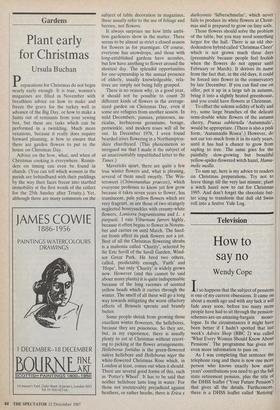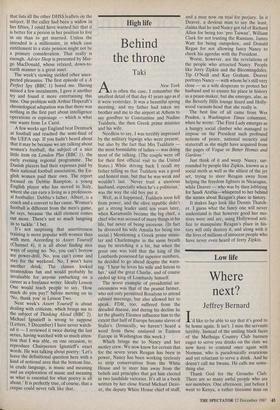Television
How to say no
Wendy Cope
It so happens that the subject of pensions is one of my current obsessions. It came on about a month ago and with any luck it will fade away soon, before too many more people have had to sit through the pension- schemes-are-an-amazing-bargain mono- logue. In the circumstances it might have been better if I hadn't spotted that last week's Advice Shop (BBC 2) was called `What Every Woman Should Know About Pensions'. The programme has given me even more information to pass on.
As I was completing that sentence the telephone rang and there is now one more person who knows exactly how many years' contributions you need to get the full state retirement pension, plus the title of the DHSS leaflet (`Your Future Pension') that gives all the details. Furthermore, there is a DHSS leaflet called 'Retiring' that lists all the other DHSS leaflets on the subject. If the caller had been a widow in her fifties, I could have warned her that it is better for a person in her position to live in sin than to get married. Unless the intended is a millionaire, in which case entitlement to a state pension might not be a primary consideration. That really is enough. Advice Shop is presented by Mar- go MacDonald, whose relaxed, down-to- earth manner is a great asset.
The week's viewing yielded other unex- pected pleasures. The first episode of a A Perfect Spy (BBC 1) bored me. Having missed a few instalments, I gave it another try and found it more entertaining this time. One problem with Arthur Hoperaft's chronological adapation was that there was nothing in the first part about intelligence operations or espionage — which is what one wants from Le Carre.
A few weeks ago England beat Denmark at football and reached the semi-final of the UEFA cup. If you hadn't heard about that it may be because we are talking about women's football, the subject of a nice little item on London Plus (BBC 1), the early evening regional programme. The Danish players had their expenses paid by their national football association, the En- glish women paid their own. The report focused on Debbie Bampton, a young English player who has moved to Italy, where she can earn a living as a profession- al footballer. Debbie's father, Albert, is a coach and a convert to her cause. Women's football is different from the men's game, he says, because 'the skill element comes out more. There's not so much lungeing in to tackle.' I bet.
It's not surprising that assertiveness training is more popular with women than with men. According to Assert Yourself (Channel 4), it is all about finding nice ways of saying no. No, you can't borrow my power-drill. No, you can't come and stay for the weekend. No, I won't have another drink. The classes looked tremendous fun and would probably be invaluable for anyone embarking on a career as a freelance writer. Ideally Lesson One would teach people to say, 'How much do you pay?' before moving on to `No, thank you' in Lesson Two.
Next week's Assert Yourself is about dealing with criticism, which brings me to the subject of Thinking Aloud (BBC 2). Michael Ignatieff is wrong to suppose (Letters, 5 December) I have never watch- ed it — I reviewed it twice during the last series, having watched with so much atten- tion that I was able, on one occasion, to reproduce Chairperson Ignatieff's exact words. He was talking about poetry: 'Let's leave the definitional question here with a kind of notional area that the bottom line, in crude language, is music and meaning and an exploration of music and meaning as what is essential for what poetry is all about.' It is perfectly true, of course, that a corpse could never talk like that.



























































 Previous page
Previous page